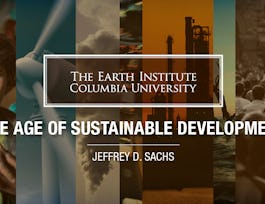Welcome to Climate Resilience and Urban Sustainability, the first course in the Building Sustainable Cities Specialization. By completing Climate Resilience and Urban Sustainability, you will gain the ability to apply a comprehensive toolkit of case studies to address urban resilience and sustainability. You will be empowered to create and advocate for policy, technological, and other changes aimed at improving these outcomes within their communities. You will also develop the skills to analyze and understand the origins, causes, and consequences of current sustainability and resilience challenges.



Climate Resilience and Urban Sustainability
This course is part of Building Sustainable Cities Specialization


Instructors: William Shutkin
Sponsored by Syrian Youth Assembly
Recommended experience
What you'll learn
Understand why urban resilience is important in the context of global climate change and social equity, and challenges facing today’s cities.
Analyze the history of land use and urban development in the US, especially the rise of the automobile, sprawl, and dependence on fossil fuels.
Understand the origins of New Urbanism, Smart Growth, and other planning frameworks, and the role of environmental law in new development patterns.
Evaluate sustainability practices and policies through an equity lens, and introduce the environmental justice movement.
Details to know

Add to your LinkedIn profile
13 assignments
September 2024
See how employees at top companies are mastering in-demand skills

Build your subject-matter expertise
- Learn new concepts from industry experts
- Gain a foundational understanding of a subject or tool
- Develop job-relevant skills with hands-on projects
- Earn a shareable career certificate


Earn a career certificate
Add this credential to your LinkedIn profile, resume, or CV
Share it on social media and in your performance review

There are 5 modules in this course
Welcome to the Climate Resilience and Urban Sustainability course. Get started by meeting the instructors, reviewing expectations for the specialization and course, and introducing yourself to the class.
What's included
2 videos2 readings1 discussion prompt
This module addresses the resilience and sustainability challenges facing modern cities and regions, emphasizing the importance of urban resilience in the context of global climate change and social equity. You will identify specific challenges within your own community, exploring how these issues may be impacted by climate change. Through case studies and quizzes, the module provides insights into effective strategies for building sustainable and resilient urban environments.
What's included
6 videos12 readings4 assignments1 peer review1 discussion prompt
This module explores the history of land use and urban development in the U.S., focusing on the rise of the automobile, urban sprawl, and fossil fuel dependence. It examines the policies and politics that subsidize unsustainable development patterns and discusses the social, economic, and environmental risks associated with various land use patterns, including forests, coastlines, and urban centers. Participants will analyze how these factors contribute to current community challenges.
What's included
5 videos9 readings3 assignments1 peer review1 discussion prompt
This module explores the origins of New Urbanism, Smart Growth, and other planning frameworks developed in response to urban sprawl, car dependence, and environmental degradation. It examines how changes in environmental law and policy have influenced land use and development patterns, and investigates the connections between housing and climate action as strategies to address environmental challenges and achieve sustainability goals.
What's included
8 videos12 readings3 assignments1 peer review1 discussion prompt
This module examines the equity impacts of auto-dependence and single-family zoning, applying systems thinking to identify global urban sustainability challenges. You will evaluate sustainability practices and policies through an equity lens, exploring how urban design can promote social and economic equity. The module includes case studies and quizzes to deepen understanding of environmental justice and the role of inclusive planning in creating equitable urban futures.
What's included
4 videos12 readings3 assignments1 peer review1 discussion prompt
Instructors


Offered by
Why people choose Coursera for their career




Recommended if you're interested in Physical Science and Engineering

Banco Interamericano de Desarrollo

Columbia University

Banco Interamericano de Desarrollo

University of Colorado Boulder

Open new doors with Coursera Plus
Unlimited access to 10,000+ world-class courses, hands-on projects, and job-ready certificate programs - all included in your subscription
Advance your career with an online degree
Earn a degree from world-class universities - 100% online
Join over 3,400 global companies that choose Coursera for Business
Upskill your employees to excel in the digital economy


